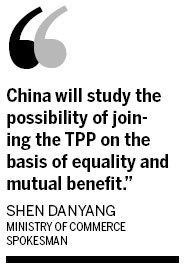'Disruptive, lacking in economic sense'
Updated: 2013-06-18 07:24
By He Wei (China Daily)
|
||||||||
Editor's Note: As the United States pushes for the establishment of the Trans-Pacific Partnership, it has raised wide concerns whether the attempt is meant to contain the development of the world's second-largest economy. Below are two opposing views from economists and researchers:
Two parallel trade agendas in Asia have led to widespread concern among observers over whether the United States intends to encircle China via economic means.
The Asian track of free trade talks, namely the Regional Comprehensive Economic Partnership, is largely being driven by the Association of Southeast Asian Nations.
It aims to bridge differences and provide more direct interactions among major economies that are hampered by history or geopolitics.
The Asia-Pacific track, while initiated by four small APEC economies including Singapore and Brunei, was energized by the entry of the US in 2009. In the best scenario, it might eventually lead to a region-wide Free Trade Area of the Asia-Pacific.
According to Vo Tri Thanh, vice-president of the Central Institute for Economic Management in Vietnam, the Asian template has more room for exceptions and avoids imposing constraints on the domestic regulations of economies at different levels of development and with different political systems.
"While Asian agreements typically seek gradual liberalization, the Trans-Pacific Partnership strives to create a comprehensive, '21st century' template for economic partnerships and seeks to develop common, high-quality rules to restrict possible interference with international commerce," he said.
China's attitude toward the TPP has grown more open, based on recent remarks from government officials. For instance, the spokesman for the Ministry of Commerce, Shen Danyang, said in May that China "will study the possibility of joining the TPP on the basis of equality and mutual benefit".
Hong Lei, spokesman for the Ministry of Foreign Affairs, said China is open-minded about the TPP initiative, saying it is conducive to economic integration and common prosperity in the region.
But he suggested that differences among Asian economies be taken into account, and he added that concerned parties should set standards of relevant trade agreements in line with actual international trade conditions and individual nations' realities.
Hong also warned that excessively tough standards may exclude developing economies from trade agreements, affect the agreements' validity and damage the interests of all concerned parties.

The TPP mechanism is being politically hijacked by the US, said Tan Khee Giap, co-director of the Asia Competitiveness Institute at the National University of Singapore's Lee Kuan Yew School of Public Policy.
As one of the founding members of the TPP, Singapore is "greatly disappointed" by recent developments related to the fledging agreement, Tan said during the annual Shanghai Forum at Fudan University.
Singapore is now as supportive of the Regional Comprehensive Economic Partnership as it is of the TPP, its own initiative.
The RCEP is a 16-party free trade agreement that would include ASEAN members plus Australia, China, India, Japan, South Korea and New Zealand.

 Michelle lays roses at site along Berlin Wall
Michelle lays roses at site along Berlin Wall
 Historic space lecture in Tiangong-1 commences
Historic space lecture in Tiangong-1 commences
 'Sopranos' Star James Gandolfini dead at 51
'Sopranos' Star James Gandolfini dead at 51
 UN: Number of refugees hits 18-year high
UN: Number of refugees hits 18-year high
 Slide: Jet exercises from aircraft carrier
Slide: Jet exercises from aircraft carrier
 Talks establish fishery hotline
Talks establish fishery hotline
 Foreign buyers eye Chinese drones
Foreign buyers eye Chinese drones
 UN chief hails China's peacekeepers
UN chief hails China's peacekeepers
Most Viewed
Editor's Picks

|

|

|

|

|

|
Today's Top News
Shenzhou X astronaut gives lecture today
US told to reassess duties on Chinese paper
Chinese seek greater share of satellite market
Russia rejects Obama's nuke cut proposal
US immigration bill sees Senate breakthrough
Brazilian cities revoke fare hikes
Moody's warns on China's local govt debt
Air quality in major cities drops in May
US Weekly

|

|







